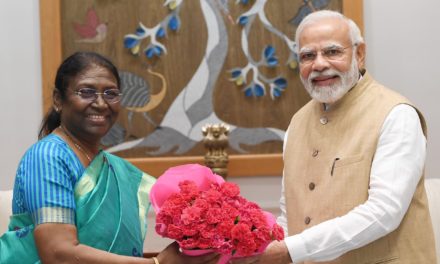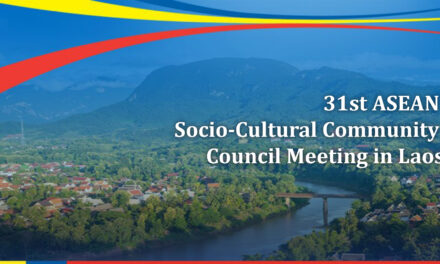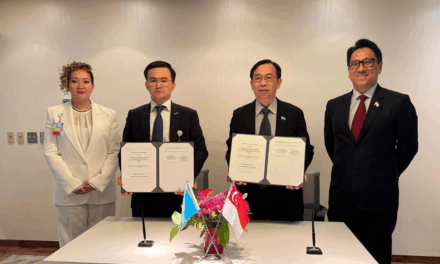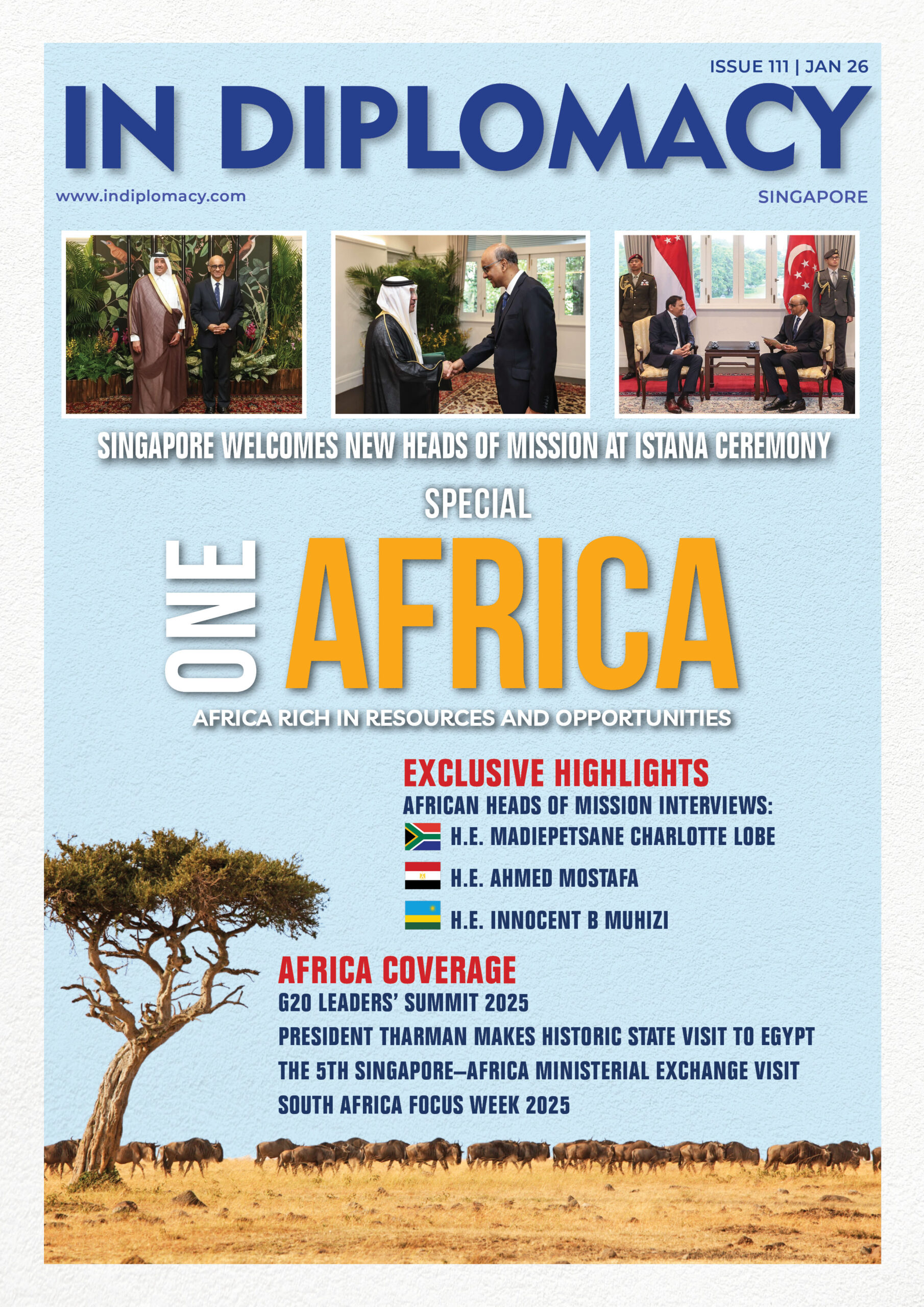Shoeb Kagda, the Chairman of the Singapore Chamber of Commerce in Indonesia, and Director of the Singapore Management University Overseas Centre, Jakarta, in conversation with Nomita Dhar. Shoeb has been based in Indonesia for 25 years. He started as a journalist and now he helps Indonesian – Singaporean businesses and students to multiply opportunities.
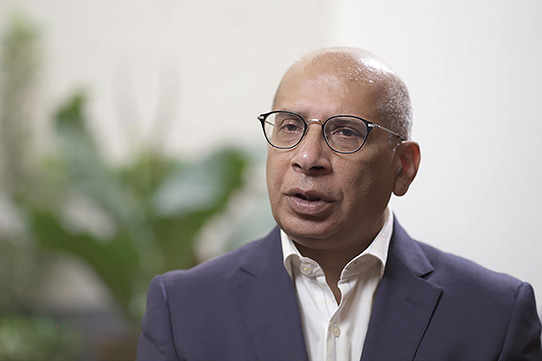
Shoeb Kagda’s background has been in the media and he explained that he came to Indonesia in 1998 primarily to cover the then political and economic crisis and was widely reporting on Indonesia. Later he started his ownamedia consulting company. He also owns the platform called Indonesia Economic Forum that brings together various stakeholders. He says he loves Indonesia and as a Singaporean he also felt that it is his primary duty to help explain Indonesia to the outside world.
According to Mr Kagda, over the past 25 years, Indonesia has moved from a centralized autocratic economy to a democratic decentralized economy! It is the fourth largest democracy in the world and he feels in the last 25 years there has been a rise of a very dynamic middle class which is driving progress in many different areas. Consumer spending has increased and is expected to grow further in the areas such as education and health care.
Mr Kagda oberves, “Indonesia also has one of the largest startup economies and digital ecosystems in the world. And all of it is being driven not only by the middle class but also a very young dynamic population. Sixty percent of the population is under 35. So it has a huge runway for growth.”
He also thinks that increasingly Indonesians are also getting much more outward-looking.
Upon probing on how Indonesia is engaging with the world Mr Kagda replied, “Indonesia now walks on the global stage with a bit more spring in its step. Recently it hosted the G20 and this year it is the Chair of ASEAN. So it has come a long ways since 1998. It is not just on the business side, one can also see it being manifested in culture, music and diplomacy.”
The Chamber, he shares organizes networking sessions as well as leadership programmes. It also participates in many economic and business forums and also works with the Indonesian government. It helps Singapore companies do two things: One, of course, to give them the lay of the land and what is going on here – what are the growth sectors; new regulations that may have been introduced etc. Secondly, it tries to help them to network with potential joint venture partners, across many sectors. So as a Chamber it acts as a bridge between the business communities on both sides. It also works very closely with the Embassy of Singapore in Indonesia, Enterprise Singapore and the EDB.
First Step for Businesses
Mr Kagda hopes that any Singapore business organisation contemplating entry into the Indonesian market takes the first step by becoming a member of the Singapore Chamber of Commerce in Indonesia. He is happy to share that after they complete and send in the membership form they become part of the ecosystem of the Chamber. The Chamber has a dynamic, very well experienced council that is selected
every year. The council members are all volunteers who give their time and share their knowledge with members.
Mr Kagda meets many young Singaporeans who come into the Chamber personally. His advice to the new entrants is to join the Chamber so that they can be part of many networking opportunities. Periodically they also invite senior Indonesian government leaders to address the members.”
Mr Kagda is also well placed to provide some indicators of where are the most active sectors in the Indonesian economy that are attracting investors. His thoughts on this subject was that they have seen a huge influx of young investors and businesses. For the big companies it is easy to do their own due dilligence and can manage on their own. The Chamber is especially catering to the needs of startup founders, young entrepreneurs and SMEs looking to venture into Indonesia. Many of the Singapore startups have come with ideas and products for the Indonesian market. There is growth in areas such as logistics, edutech, fintech and health tech. In the future especially the sectors with potential are relaed to sustainability and carbon exchange credits. In the traditional sectors like agriculture and plantation, Singapore companies can find a niche. Even plantations and retail companies are in the need of digitalization. Singapore companies, especially SMEs and startups can also play a very critical role as service providers to the food and beverage sector. Tourism sector most definitely still remains huge.”
Involvement in Indonesia Mr Kagda feels has to be long term. His advice to newcomers is “You really have to invest yourself in the country. You must like the country. If you are only coming with the thought that you are only going to make money and then go back. Then it doesn’t work. When you come here you must firstly invest yourself in the country not money. Then you will start to understand the country and then do business right.”
right, so I Think is something that we need to learn whether it’s Indonesia whether it’s Thailand or China or India Invest in the country first your time learn about a country
right? Yes, you can go there But no one explained to you, you know the marine ecology of the of the place you are diving You know those kind of things actually will add a lot to tourism. It’s not just come and lie on the beach Yeah, it’s nice. But beyond that, you know, yes where we have some knowledge I’m you know, and this is also important because it will elevate Basically, you know help to have a sustainable type tourism where people are more aware of the environment of what their impact on is an environment, you know stuff like that, so Especially for young kids. Yeah, I think that’s really going to be very important And this is where you know, the two sides can really play a role
And in terms of gender equality you’ve been in Indonesia for so many years. What changes did you see?
Well, I think gender equality Are you referring to more women in the economy in the economy in business? Yeah Contributing to the economy contributing to their own lives going out there and working. Yeah. Yeah, so you know very strangely Indonesian women are actually very empowered. Yes Yeah, so you do not see any systemic Downgrading of women. In fact, many of the companies are run by women. Yes. So in terms of gender equality where I see maybe Potential for improvement is really in the professional fields, right? More women coming into the professional fields in the business fields. They’re there many women entrepreneurs I don’t think they need any help there but in the professional fields, you know especially in our sectors like finance Sectors like The legal the legal for tenant they are but I think that there can be more there’s always room for Improvement, right? You also see a lot of women Startup founders you’ll be surprised. I’ve met many of them very dynamic women, right? So I don’t think there’s a barrier to them It’s only basically entry-level assistance, you know networking there are a lot of women networks, but I Feel that you know, there should be more I would you know, it’s not so much women helping women but you know the society helping women, right? So men should also play a role. There’s not only women up to women So I think in terms of like large corporations where you may have a male CEO, you know Would they be more open to getting women up into the corporate board levels? You know, I Helps but I -think recognition that women can play Just as I mean I just a role just as important as men.
I Think that’s critical You put up this Publication or list. I’m not too sure of the richest Indonesians. Yes. What is the fabric of these kind of people? How can one become one like that? What is a fabric?
So I was editor-in-chief of a magazine called Globe Asia I founded it actually I found it at magazine so we we we published the annual hundred and fifty which is Indonesian’s list and So in that we really look at the entrepreneurial spirit rather than the wealth Creation right how did these people become wealthy? So across across many of these businesses and wealthy individuals is entrepreneurship and I think Indonesia because It’s a large economy number one, but number two it is really a very entrepreneurial driven economy because Unlike Singapore, I don’t know whether I’m gonna be trouble saying this the government gives you no help So you have to depend on yourself and you have to pull up your socks. There are no handouts, right? So in that sense Indonesians become very entrepreneurial. They look for opportunities. They figure out how to get things done And they are very business savvy people, you know, they can grow big businesses So I think you know if you talk about the conglomerate families That’s you know been around for 50 60 years, right? But you’ve seen new new wealth being created I mean one of the one of the most Iconic companies in Indonesia today is Gojak. Gojak was created by Wu None of the conglomerates it was created by Nadim and his friends Yeah, and there’s an opportunity to do that. I think very few countries will give you that opportunity you know and unfortunately, I was supported late later on by Many of the conglomerates saying okay. We want to be part of this growth story, right? So they got funding and all that but basically it was a it was put together by two or three young Indonesians Who had an idea and grew it into a global company? You know, we are always accused as Singaporeans to be very spoiled. We can’t adjust in any any other place You you must be one of few examples of a Singaporean son who has relocated to Indonesia
What has Indonesia done to you? How? How did this change occur and do you think you would like to send a message to other Singaporeans? Go out of the island and look for greener pastures or more experiences. What would your what would you say?
Yeah, okay yeah, so I mean when I I agree to come actually I wanted to come to Indonesia to cover the crisis probably because It was the biggest story. Yes, and I had been covering Indonesia Prior to that, so I had an I had an interest in this country But of course I stayed Yeah, and it opened up many opportunities for me I told you about launching a new magazine Yes, you think you could do that in Singapore. I I really don’t think so, right? I –
mean there are opportunities, but I think it’s important for Singaporeans When they when they are looking for such opportunities is really to invest yourself in that country Yes, you know, I learned the language. I have a lot of Indonesian friends, you know You must like the country yes, I’m coming with this mentality that I’m only going to make money and go back Then it doesn’t work. You I always tell them I always tell people who come here I’m a one firstly invest in the country not money, but yourself. Yes your time Interest and then you will start to understand the country and then you then only you do business right, so I Think is something that we need to learn whether it’s Indonesia whether it’s Thailand or China or India Invest in the country first your time learn about a country Lovely lovely sharing now.
So what is your status in Indonesia? So I am still a Singaporean. I hold a I I am here on what we call long-term work We call it KITAS. So we just have to renew it every year, you know, so it’s like PR But you just have to renew it every year That’s the legal status of foreigners who want to work here We sell it we we talk to you because Indonesia also Singapore are celebrating their national days
in your Opinion sitting at where you are. What is there to celebrate in for Singapore for Indonesia
Well, okay, so I think Let’s say of course for Singapore we celebrate our independence we celebrate, you know our Achievements we celebrate the fact that we are a nation that we build a nation from really nothing We are a major I Recall Basically we Singapore is well recognized around the world for what it’s achieved right and also for its business culture for its inefficiency right But I think more importantly between the two countries I mean those are in Indonesia also, of course, you know, you can recognize Indonesia for its achievements as a democracy As one of the faster-growing economies in the world Its diversity in terms of its culture its natural heritage. Yeah, but I think more importantly I think we should be celebrating our our friendship and Celebrating the closeness. I think a lot of people don’t understand how close we are all the different ties It’s not just family ties, but many different ties school ties. I’ve you know across both sides People you know Singaporeans connect to Indonesians Indonesians connect to Singapore we are in a fight in I would say in a way we are tight at the hips and We need to understand that and we should celebrate that we should celebrate that friendship that closeness The cultural links and the business links, of course the economic links, but more importantly, I think Indonesians and Singaporeans we kind of We need each other like family members, yes, you know, so I would say we are siblings we should celebrate that
Thank you very much for sharing and I I completely agree with you and So that’s that’s the last question for my interview
Source – The Article appeared in Sun Media Magazine
” IndoConnect – Rise Of Nusantara “
To Request PDF – Click ( https://www.sunmediaonline.com/magazine/indoconnect/indoconnect_se04.pdf )

